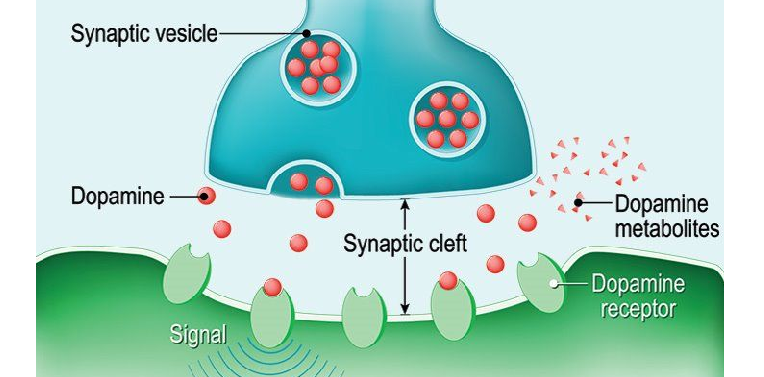
Dopamine, a vital neurotransmitter in the brain, has long fascinated scientists and researchers for its significant impact on both brain health and cognitive function. This essential chemical messenger plays a crucial role in numerous brain processes, ranging from regulating emotions to controlling motor functions. Here we delve into the intriguing dual role of dopamine in maintaining brain health, as well as its influence on cognitive abilities such as motivation, decision-making, and learning.
Contents
What Is Dopamine?
Dopamine is a neurotransmitter — a chemical messenger — that plays a vital role in the complex workings of the human brain. This multifaceted molecule not only contributes to brain health by protecting neurons and promoting neuroplasticity, but it also significantly influences cognitive functions, such as motivation, decision-making, and learning.
In recent years, dopamine has become a subject of great interest among researchers, healthcare professionals, and the general public alike, as understanding its dual role may provide valuable insights for optimizing brain function and overall well-being.
Brief Explanation of Dopamine
Dopamine is a type of neurotransmitter, a chemical that transmits signals between nerve cells in the brain and other areas of the body. Produced in several areas of the brain, including the substantia nigra and the ventral tegmental area, dopamine is involved in a multitude of functions [1].
It plays a critical role in the brain’s reward system, motor control, and the regulation of mood, among other things. The precise function of dopamine depends on the specific brain region in which it is active, as well as the type of receptors it interacts with on the surface of neurons.
Dopamine’s importance in the brain and body cannot be overstated. Its involvement in crucial physiological processes has far-reaching implications for our physical and mental health. Abnormal dopamine levels have been implicated in numerous neurological and psychiatric disorders, such as Parkinson’s disease, schizophrenia, and depression [2].
Dopamine plays a key role in motivation, focus, and overall cognitive performance, which are essential aspects of daily life. Consequently, maintaining a healthy dopamine balance is of paramount importance for overall well-being.
Introduction to Dopamine’s Dual Role
Dopamine’s role in brain health primarily stems from its neuroprotective and neuroplasticity-enhancing properties. It helps protect neurons from damage by combating oxidative stress and promoting the formation and maintenance of new neural connections. This, in turn, supports brain function and resilience in the face of injury, aging, or disease.
Dopamine’s impact on cognitive function is multifaceted, encompassing motivation, decision-making, and learning. Its influence on the brain’s reward system drives goal-directed behavior and promotes productivity. Dopamine is involved in various aspects of decision-making, such as cost-benefit analysis and risk-taking behavior. It also plays a critical role in reinforcement learning, attention, and memory consolidation.

Dopamine’s Role in Brain Health
Dopamine’s involvement in maintaining brain health is multifaceted, encompassing neuroprotection, neuroplasticity, and a connection to various neurological disorders. Understanding these aspects of dopamine’s function can help us appreciate the importance of this neurotransmitter in promoting a healthy and well-functioning brain.
Dopamine and Neuroprotection
A crucial aspect of dopamine’s role in brain health is its contribution to neuroprotection. Dopamine acts as a safeguard for the brain by delving through its antioxidant properties and its ability to prevent neuron damage.
Antioxidant Properties
Dopamine contributes to brain health by acting as a neuroprotective agent [3]. One of its key roles in neuroprotection is its antioxidant properties, which help combat oxidative stress. Oxidative stress occurs when there is an imbalance between the production of reactive oxygen species (free radicals) and the body’s ability to neutralize them. This imbalance can lead to cellular damage, including damage to neurons. Dopamine can counteract the harmful effects of oxidative stress by neutralizing free radicals and reducing inflammation, thus protecting neurons from damage and supporting overall brain health.
Prevention of Neuron Damage
Dopamine’s neuroprotective effects extend beyond its antioxidant properties. It also plays a role in preventing neuron damage by modulating the activity of various cellular processes [4]. For example, dopamine has been shown to help regulate the release of glutamate, an excitatory neurotransmitter that can cause neuron damage when present in excessive amounts. By maintaining the delicate balance between excitation and inhibition in the brain, dopamine helps protect neurons from damage and ensures the proper functioning of the nervous system.
Dopamine and Neuroplasticity
Another vital aspect of dopamine’s role in brain health lies in its influence on neuroplasticity. Dopamine contributes to the formation of new neural connections, strengthens existing ones, and plays a key role in learning and memory processes.
Formation of New Neural Connections
Neuroplasticity refers to the brain’s ability to adapt and change in response to new experiences, learning, and challenges. This dynamic process involves the formation of new neural connections, also known as synapses, and the strengthening or weakening of existing ones. Dopamine plays a crucial role in neuroplasticity by promoting the formation of new synapses and supporting the survival of newly formed neurons [5]. This is particularly important in brain regions involved in learning, memory, and cognitive function, such as the hippocampus and prefrontal cortex.
Strengthening Existing Connections
In addition to fostering the formation of new neural connections, dopamine also plays a role in strengthening existing ones. This process, known as synaptic plasticity, is essential for learning and memory consolidation. Dopamine enhances synaptic plasticity by modulating the release of other neurotransmitters and altering the responsiveness of neurons to incoming signals. By facilitating the communication between neurons and promoting the adaptive changes necessary for learning and memory, dopamine contributes significantly to cognitive function and overall brain health.
Role in Learning and Memory
Dopamine’s impact on neuroplasticity directly influences learning and memory processes. As mentioned earlier, dopamine promotes the formation of new synapses and strengthens existing ones, which are essential components of learning and memory consolidation.
Dopamine has been implicated in various aspects of learning, such as reinforcement learning, where it signals the occurrence of rewarding or punishing events and helps guide future behavior [6]. By supporting neuroplasticity and facilitating learning processes, dopamine plays a critical role in maintaining brain health and cognitive function.
Dopamine Imbalance and Neurological Disorders
An imbalance in dopamine levels can have significant consequences for brain health, as it has been implicated in various neurological disorders. In this section, we will explore how disruptions in dopamine function contribute to conditions such as Parkinson’s disease, schizophrenia, ADHD, and depression. By understanding the connection between dopamine imbalances and these disorders, we can appreciate the importance of maintaining a healthy dopamine system for overall brain health.
Parkinson’s Disease
Parkinson’s disease is a progressive neurodegenerative disorder characterized by the loss of dopamine-producing neurons in the substantia nigra, a region of the brain involved in motor control [7]. The resulting dopamine deficiency leads to the hallmark motor symptoms of Parkinson’s disease, including tremors, rigidity, and bradykinesia (slowness of movement).
Current treatments for Parkinson’s disease, such as levodopa, focus on increasing dopamine levels in the brain to alleviate these motor symptoms. However, these treatments do not address the underlying neuronal loss and may have diminishing effectiveness over time.
Schizophrenia
Schizophrenia, a complex psychiatric disorder, has also been linked to dopamine imbalances [8]. Researchers have proposed the dopamine hypothesis, which suggests that the symptoms of schizophrenia are related to dysregulated dopamine activity in various brain regions.
According to this hypothesis, an overabundance of dopamine in certain areas, such as the mesolimbic pathway, may contribute to the positive symptoms of schizophrenia (e.g., hallucinations and delusions), while a deficit of dopamine in other regions, like the prefrontal cortex, may be responsible for the negative symptoms (e.g., social withdrawal and apathy). Antipsychotic medications used to treat schizophrenia primarily work by blocking dopamine receptors, thereby reducing dopamine activity.
ADHD
Attention-deficit/hyperactivity disorder (ADHD) is a neurodevelopmental disorder characterized by symptoms of inattention, impulsivity, and hyperactivity. Research has suggested that individuals with ADHD may have alterations in dopamine function, including reduced dopamine transporter availability and lower dopamine receptor density [9].
These alterations may contribute to the core symptoms of ADHD, as dopamine is involved in various cognitive processes, such as attention, motivation, and impulse control. Stimulant medications, such as methylphenidate and amphetamine, are commonly prescribed for ADHD and work by increasing the availability of dopamine in the brain, thereby improving cognitive function and reducing symptoms.
Depression
Depression, a prevalent mental health disorder, has also been associated with imbalances in dopamine, as well as other neurotransmitters like serotonin and norepinephrine [10]. While the exact mechanisms underlying depression are still not fully understood, it is believed that reduced dopamine function may contribute to the symptoms of anhedonia (inability to experience pleasure) and lack of motivation often seen in individuals with depression.
Some antidepressant medications, such as selective serotonin and norepinephrine reuptake inhibitors (SSRIs and SNRIs), indirectly affect dopamine levels by increasing the availability of other neurotransmitters that modulate dopamine release. Other medications, like certain atypical antidepressants, may have a more direct effect on dopamine function.

Dopamine’s Role in Cognitive Function
In addition to its impact on brain health, dopamine also plays a crucial role in various aspects of cognitive function. In this section, we will explore how dopamine influences motivation, decision-making, and learning, demonstrating its importance in shaping our cognitive abilities and everyday experiences.
Dopamine and Motivation
A key aspect of dopamine’s role in cognitive function lies in its influence on motivation. Dopamine drives goal-directed behavior and shapes our pursuit of desirable outcomes.
Introduction to Motivation and the Reward System
Motivation is a fundamental cognitive process that drives goal-directed behavior, helping us pursue our desires and achieve our objectives. Central to motivation is the brain’s reward system, a complex network of neural circuits that signal the occurrence of rewarding events and guide our behavior towards those that are most advantageous. Dopamine is a critical component of the reward system, modulating our motivation by signaling the anticipation and experience of rewards [11].
The Role of Dopamine in the Reward System
Dopamine plays a central role in the reward system by signaling the value of potential rewards and facilitating goal-directed behavior. When we anticipate or experience a rewarding event, dopamine is released in various brain regions, including the nucleus accumbens and the prefrontal cortex.
This dopamine release serves to reinforce the association between specific actions and their rewarding outcomes, increasing the likelihood that we will engage in those actions again in the future. Consequently, dopamine is involved in various aspects of motivated behavior, such as effort expenditure, persistence, and goal-setting.
Dopamine and Decision-Making
Another important dimension of dopamine’s role in cognitive function is its impact on decision-making. Dopamine contributes to various aspects of this crucial cognitive process, including cost-benefit analysis, risk-taking behavior, and the integration of past experiences.
Introduction to Decision-Making
Decision-making is another essential cognitive function that involves evaluating options, weighing their potential outcomes, and choosing the most appropriate course of action. Dopamine is intricately involved in this process, influencing various aspects of decision-making, such as cost-benefit analysis, risk-taking behavior, and the integration of past experiences.
The Role of Dopamine in Decision-Making
Dopamine influences decision-making by modulating the valuation of potential outcomes and guiding our choices accordingly. For example, research has shown that increased dopamine activity in the prefrontal cortex is associated with greater willingness to expend effort for rewards, suggesting that dopamine helps us evaluate the benefits of potential actions relative to their costs [12].
Dopamine has been implicated in risk-taking behavior, with higher dopamine levels promoting risk-seeking tendencies and lower levels favoring risk-averse choices. Finally, dopamine also plays a role in the integration of past experiences into current decision-making, helping us learn from previous outcomes and adapt our choices accordingly.
Dopamine and Learning
Dopamine’s influence on cognitive function also extends to learning, a fundamental process that allows us to acquire new information and adapt to our environment.
Introduction to Learning
Learning is a fundamental cognitive process that allows us to acquire new information, adapt to our environment, and develop new skills. Dopamine is deeply involved in various aspects of learning, such as reinforcement learning, attention, and memory consolidation.
The Role of Dopamine in Learning
Dopamine’s role in learning is multifaceted, encompassing several distinct processes. In reinforcement learning, dopamine signals the occurrence of rewarding or punishing events, helping us update our expectations and guide future behavior [13]. Research has shown that dopamine neurons in the midbrain display activity that encodes prediction errors — the difference between expected and actual outcomes — which are critical for updating our internal models of the world.
In addition, dopamine plays a role in attention and memory consolidation, two processes essential for effective learning. Dopamine has been shown to modulate attention by influencing the salience of stimuli, helping us focus on relevant information and filter out distractions. Dopamine is involved in memory consolidation, the process by which new information is integrated into long-term memory. This process is facilitated by dopamine’s impact on synaptic plasticity, as discussed earlier, which allows for the strengthening of neural connections that underlie the formation and retrieval of memories.
The Double-Edged Sword of Dopamine
While dopamine plays a critical role in promoting brain health and cognitive function, it can also have negative consequences when present in excessive or insufficient amounts.
The Benefits of Dopamine
Dopamine’s influence on the brain and cognitive function is not solely limited to its essential roles; it also brings about several notable benefits, such as its impact on mood enhancement, pleasure, and overall well-being.
Introduction to Dopamine’s Positive Effects
As discussed in previous sections, dopamine is essential for numerous aspects of brain health and cognitive function, including neuroprotection, neuroplasticity, motivation, decision-making, and learning. These positive effects of dopamine highlight its importance in maintaining a healthy, well-functioning brain and supporting our ability to navigate and adapt to the challenges of daily life.
Mood Enhancement and Pleasure
One of the most well-known benefits of dopamine is its role in enhancing mood and promoting feelings of pleasure. Dopamine is often referred to as the “feel-good” neurotransmitter, as it is released during rewarding experiences, such as eating a delicious meal, engaging in physical activity, or experiencing social connection [14]. By signaling the occurrence of rewarding events, dopamine contributes to our overall sense of well-being and helps motivate us to pursue activities that bring us happiness and satisfaction.
The Potential Drawbacks of Dopamine
Despite its numerous benefits, dopamine can also present certain challenges when its levels become dysregulated, such as its role in addiction, impulsivity, and altered reward processing.
Introduction to Dopamine’s Negative Effects
Despite its many benefits, dopamine can also have negative consequences when its levels are not properly regulated. Excessive or insufficient dopamine can contribute to various neurological and psychiatric disorders, as well as issues related to addiction, impulsivity, and altered reward processing.
Addiction and Impulsivity
Dopamine plays a central role in the development of addiction, as it is involved in the reinforcement of drug-seeking behaviors and the experience of drug-related rewards [15]. Drugs of abuse, such as cocaine and amphetamines, directly or indirectly increase dopamine levels in the brain, leading to feelings of euphoria and reinforcing the desire to consume the drug. Over time, chronic drug use can lead to alterations in the dopamine system, resulting in increased tolerance, dependence, and withdrawal symptoms.
In addition to addiction, excessive dopamine levels have also been implicated in impulsivity, a tendency to act on a whim without considering the consequences of one’s actions. Impulsivity is a common feature of various psychiatric disorders, such as ADHD and bipolar disorder, and has been linked to alterations in dopamine function.
Altered Reward Processing
Another potential drawback of dopamine dysregulation is its impact on reward processing. Imbalances in dopamine levels can lead to altered perceptions of reward value and a decreased ability to experience pleasure from everyday activities, a phenomenon known as anhedonia. Anhedonia is a common symptom of various psychiatric disorders, such as depression and schizophrenia, and has been associated with disruptions in dopamine function.
The Importance of a Balanced Dopamine System
Given the double-edged nature of dopamine, it is crucial to maintain a balanced dopamine system for optimal brain health and cognitive function. Strategies for promoting a balanced dopamine system include engaging in regular physical activity, consuming a balanced diet rich in nutrients that support dopamine production, managing stress, and getting adequate sleep.
In some cases, medications or other therapeutic interventions may be necessary to address dopamine imbalances and restore optimal brain function. By maintaining a balanced dopamine system, we can harness the positive effects of dopamine while minimizing its potential drawbacks, supporting a healthy, well-functioning brain throughout our lives.
References
[1] What is Dopamine?
[2] The interplay of dopamine metabolism abnormalities and mitochondrial defects in the pathogenesis of schizophrenia
[3] The Neuroprotective Effects of Exercise: Maintaining a Healthy Brain Throughout Aging
[4] Dopamine: The Neuromodulator of Long-Term Synaptic Plasticity, Reward and Movement Control
[5] The Neuroscience of Drug Reward and Addiction
[6] The Impact of Cortisol on Memory and Learning
[7] Epidemiology, pathogenesis, and genetics of Parkinson disease
[8] What is the connection between dopamine and schizophrenia?
[9] Evaluating Dopamine Reward Pathway in ADHD
[10] Dopamine Deficiency: Symptoms, Causes & Treatment
[11] Dopamine in Motivational Control: Rewarding, Aversive, and Alerting
[12] Dopamine impacts your willingness to work
[13] Dopamine signals for reward value and risk: basic and recent data
[14] Dopamine: The pathway to pleasure
[15] Addiction and the brain: the role of neurotransmitters in the cause and treatment of drug dependence

